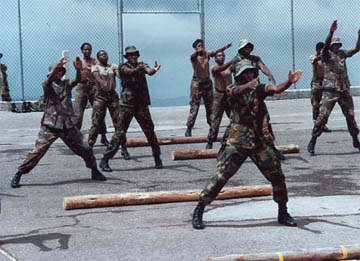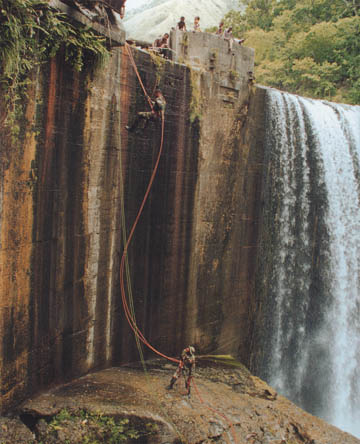|
|||||||||||||||||||||||||||||||
| Home > Info Centre > Publications > Alert 2000 > Getting Ready for the Next One | |||||||||||||||||||||||||||||||
|
|
We prepare for war through training and by equipping the organization with the materiel needed to defeat the expected foe. The conventional wisdom is that we should train for our wartime role and at the highest level of conflict to which we as a Light Infantry Brigade would be committed. Conventional wisdom also dictates that we train the way we plan to fight. Civilian control over the military, exercised through the constituted arrangements, has been maintained. The JDF therefore does not choose the conflicts in which it will intervene. We therefore must be in a state of readiness for the range of military operations to which we could be committed.
The JDF is one of Jamaica’s instruments of national power and influence. It has been deployed on security interventions to further Jamaica’s foreign policy objectives in the Caribbean region for example in Grenada, Trinidad and Tobago and Haiti. These operations may be classified as Peacekeeping Operations. The Force has, in addition, participated in civil projects in Antigua and Barbuda, the Bahamas, St Kitts and Monsteratt, in the spirit of regional cooperation. We even extended our reach in a small way to the African continent, when we provided training assistance to the security forces of Uganda, in the early 1980s. Our most persistent employment has been on the domestic front. Here the Force has intervened jointly with the Constabulary Force, to bring stability to communities suffering from intercommunal violence and general lawlessness. We have also consistently provided aid to the civil authorities in numerous ways that are consistent with our stated roles. In the Grenadian and Haitian conflicts, we entered coalitions led by the United States military at the outset. Jamaica provided the lead for the Caribbean contingent in both instances. Jamaica has also been at the forefront of the civil projects undertaken. On the home front, the Military’s involvement in security interventions has been at the request of the Constabulary. The strategies applied have frequently been those of the Police, with only minimal joint planning. There remains, within and between communities, persistent conflict on the home front, for which several explanations are offered. Among these may be included the possibility that some of our strategies and modalities may have been inappropriate, under the prevailing circumstances.
Our annual regional training exercises like ‘Exercise Trade Winds’ help to serve this purpose. Exercise Calypso Hop also serves as a test of our readiness and familiarity with overseas deployments and helps to strengthen our bonds with the British military. Considering that we have been undertaking operations with the United States military, it may be to our benefit also to pursue training exchanges with selected entities of the United States Military. The JDF soldier has learnt a ‘thing or two’ about ‘Peace Enforcing’ from his operations on the streets of Kingston, that he could teach the United States Marine. With respect to the home front, while the imperative for maintaining two distinct Forces (JDF and JCF) remains, there is the urgent necessity for specialized joint JDF-JCF training in the planning and conduct of internal security operations. In addition, leaders at the various levels of command in both Forces, have to undergo formal awareness training, to improve their understanding of the social context of our most common areas of operation. The complexities of the relationships and interests of contending parties require that there be an accurate appreciation of the social, political, economic and cultural underpinnings of the society. Considerations of this sort will take a commander out of his comfort zone. This will however improve his ability to apply what the Military calls ‘operational art,’ and will influence decisions on where, when and in what strengths to engage the adversary, with the greatest likelihood of bringing about the adversary’s defeat. The skills required of the infantryman on the ground, should not have to change significantly to meet future conflicts. There may however be a need to broaden some of his skills to better equip him for airmobile operations and to make him flexible to operate perhaps as a Marine commando. With foresight, we can properly train our Force so that the Jamaican soldier may continue to rise to the occasion whenever duty calls, whether at home or abroad.
|
||||||||||||||||||||||||||||||
|
|
|||||||||||||||||||||||||||||||

 Let us examine the scenarios in which
the Jamaica Defence Force has been employed since independence. From this we may draw
reasonable deductions about what is still an undeclared national security strategy and
perhaps also forecast how the Force is likely to be employed in the future.
Let us examine the scenarios in which
the Jamaica Defence Force has been employed since independence. From this we may draw
reasonable deductions about what is still an undeclared national security strategy and
perhaps also forecast how the Force is likely to be employed in the future. Lessons from
our past deployments and our current threat assessments, serve to inform our training
agenda in preparation for future conflicts. With regard to preparation for overseas
deployments, the JDF should continue to prepare for possible partnerships in United States
or United Nations led Peace Operations, and to provide leadership in any Caribbean
military entity that may be arranged. It is important that junior and senior leaders
continue to be exposed to formal training to international standards, in the planning and
conduct of such operations.
Lessons from
our past deployments and our current threat assessments, serve to inform our training
agenda in preparation for future conflicts. With regard to preparation for overseas
deployments, the JDF should continue to prepare for possible partnerships in United States
or United Nations led Peace Operations, and to provide leadership in any Caribbean
military entity that may be arranged. It is important that junior and senior leaders
continue to be exposed to formal training to international standards, in the planning and
conduct of such operations.